Colombia has announced it will halt purchasing arms from the United States in response to Washington’s recent decision to “decertify” Bogotá under American drug-war policy. This U.S. move, its first such decertification of Colombia in nearly 30 years, accuses the country of failing to meet its obligations under international counternarcotics agreements amid surging coca cultivation and record levels of cocaine production.
President Gustavo Petro and his cabinet described the U.S. decision as a serious breach, with Interior Minister Armando Benedetti stating that Colombia will no longer buy weapons from the U.S. as of this moment. Petro framed the decision as asserting national sovereignty and reducing dependence on external suppliers.
For its part, the United States justified the decertification by citing Colombia’s inability to curb coca planting and cocaine output, and critiqued Petro’s strategy that shifted away from aggressive eradication toward more social and negotiation-based approaches with narco-armed groups. The U.S. designation puts at risk various forms of military support, non-drug assistance, and cooperative counternarcotics programs, though Washington has included a waiver citing its own national interests.
Colombian authorities warn the halt in arms purchases will have consequences for military readiness, particularly in remote coca-growing regions where equipment and logistical support have long depended on U.S. supplies. At the same time, Bogotá has signaled an intent to diversify arms acquisition, potentially seeking suppliers from other countries or increasing local production.





